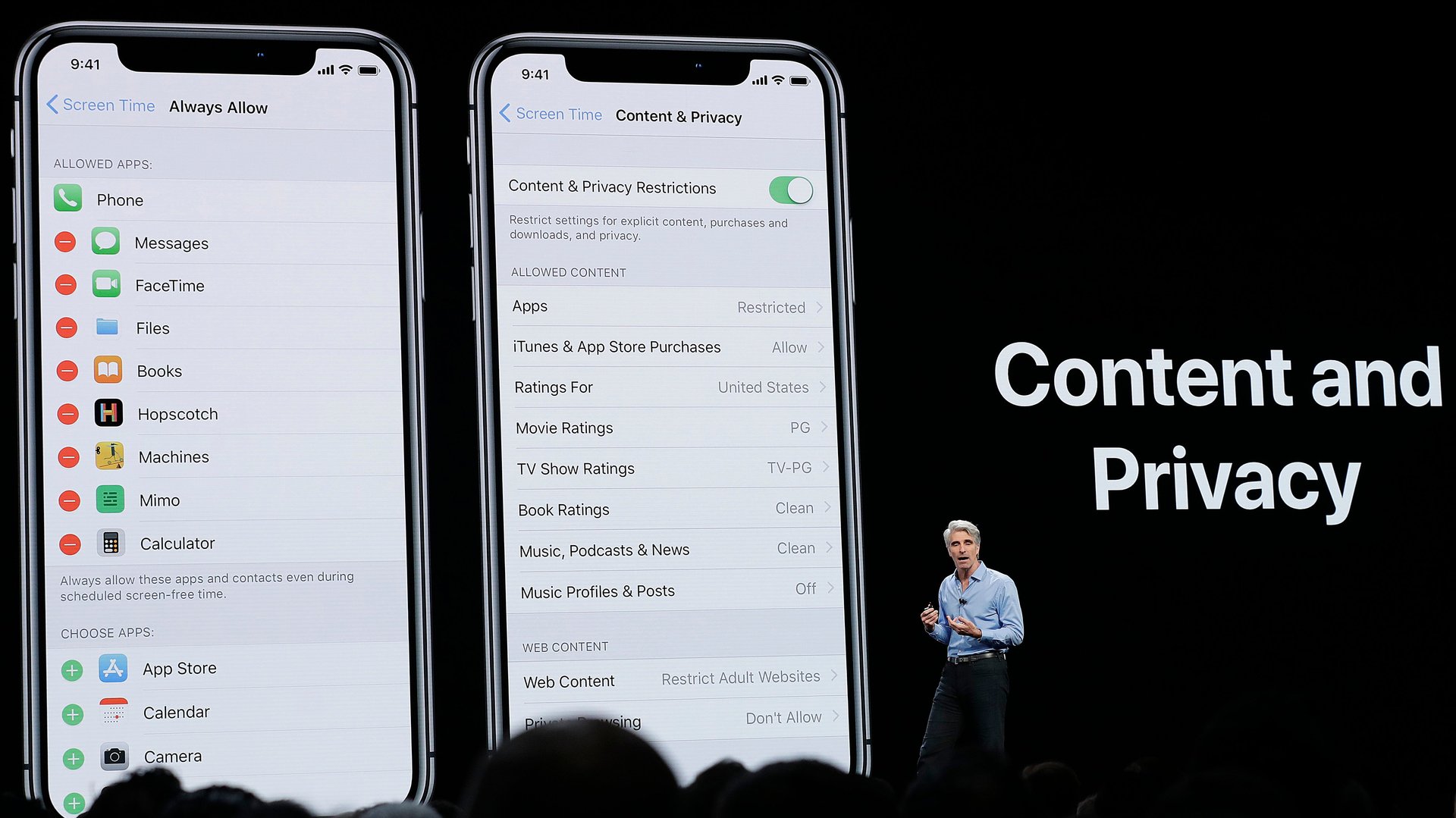Privacy is a luxury, just like a $1,000 iPhone
At Apple’s annual developer conference in California on June 4, executives unveiled a range of new services intended to make us more mindful of how we use our devices, and the information third parties have access to while we use them. The world’s most valuable company wanted you to know it cares for your wellness and your privacy.


At Apple’s annual developer conference in California on June 4, executives unveiled a range of new services intended to make us more mindful of how we use our devices, and the information third parties have access to while we use them. The world’s most valuable company wanted you to know it cares for your wellness and your privacy.
It’s a place Apple wants to firmly plant itself amid the current storm around tech. As Facebook was engulfed in a scandal over how data consultancy Cambridge Analytica accessed the data of 87 million users without their consent, Apple’s usually mild-mannered CEO, Tim Cook, had some choice words for Facebook chief Mark Zuckerberg. When asked by Recode’s Kara Swisher how he would’ve handled the situation, Cook said, “I wouldn’t be in this situation.”
“The truth is, we could make a ton of money if we monetized our customer—if our customer was our product,” Cook added. “We’ve elected not to do that.”
Onstage at the event, there were multiple, petty jabs at Facebook and its data privacy failures. Apple introduced a new dashboard to its iOS operating system that outlines how much time you’re spending with the apps on your device, tacitly implying that Facebook and its subsidiary Instagram are massive time-sucks. It even calls out Facebook in its marketing material for iOS 12, its upcoming release, online.
Later in the presentation, Apple debuted a new tool for its Safari web browser that blocks social-sharing plugins that are pretty much ubiquitous online, which it says are used by companies to track you around the web. In the presentation, Apple specifically showed a Facebook comment plugin, where a website has installed Facebook code to have a comments section on their site.
Apple has been a big part of the privacy conversation before. It took a stand against the FBI in 2016 when it refused a federal judge’s order to open an iPhone owned by one of the San Bernardino shooters. It was heralded as a win for consumer privacy, courtesy of a company rich enough to take on just about any legal battle.
More recently, the company introduced new tools to alert users when one of its products or services wants to use their personal data. While this was mainly so that Apple was in compliance with the EU’s new advertising privacy regulations, Apple painted it as another move done for the consumer. “Apple believes privacy is a fundamental human right, so every Apple product is designed to minimize the collection and use of your data,” the company’s new privacy pop-up alerts users.
If Apple is the company that will protect you from the tendrils of the internet, or yourself, that service doesn’t come cheap. Apple’s flagship phone starts at $1,000, its cheapest at $349 (but is three years old), and the average price of a iPhone bought by consumers last quarter was $728. The average price of all smartphones sold in the world is around $363. The average US household income only just surpassed its 1999 heights, but the top one-fifth account for more than half of all US income. Apple devices, especially the newer ones, are luxury items only really affordable to the well-off in the US. For those who can’t afford one, the choice is between less secure, more surveilled devices, and … nothing. More and more of our lives are governed by access to devices, and there are even programs and jobs that require computer access to even apply, meaning low-income individuals can only choose devices where they’re tracked and marketed to at all times, if they can afford anything.
Valued at nearly $1 trillion, Apple is in the privileged position to take on just about any cause it chooses, and some, such as Facebook chief information security officer Alex Stamos, question the earnestness of Apple’s privacy overtures.
Regardless of motives, when Apple’s walled garden is compared to Google’s more laissez-faire approach to security with Android, or the scandals Facebook has recently been through, or when Yahoo leaked data on 3 billion mail accounts and the company initially said it wasn’t that many, or when a breach leaked 20 million Uber users’ data and the company covered it up—Apple does look pretty good.
It’s just shame that that privacy has to come at such a high price.